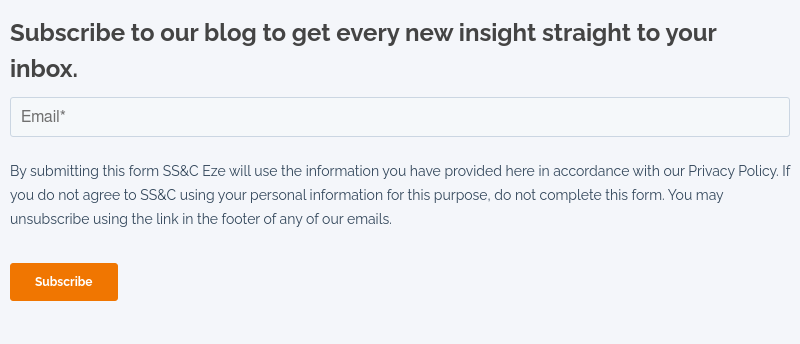As firms start up in the hedge fund and alternatives space, they have a lot of things to think about: selecting a fund administrator and trading system, configuring compliance checks, and establishing a book of record, just to name a few.
Often, they do all this while facing resource constraints – limited tools, no single source of truth, and a modest team and budget.
This dynamic puts a burden on the entire operation.
Faced with these limitations, emerging back-office teams often start out thinking they can cobble together their accounting operations by combining fund administrator exports with spreadsheets for reconciliation.
Over time, these firms find that not only is this patchwork approach overly manual – taking time away from focusing on the things that matter most – it also adds unnecessary risk.
Fortunately, there is a better way. By implementing an accounting system from the start, hedge funds can avoid the hassle and overhead of finding and adding staff to manage Excel sheets and avoid the inherent risk manual processes add.
However, with limited resources, hedge funds need to be selective about the accounting solution they pick. It’s important to find one that supports a solid foundation for their back office and alleviates manual labor without breaking the bank.
In a recent episode of our Tech It Up podcast, Starting Up Right: Accounting Must-Haves, Aani Nerlekar, vice president of solutions management and sales engineering at SS&C, and I joined hosts Jasmin Conner and Trent Berry to discuss the accounting functionality startup and emerging firms should prioritize as they build out their back-office investment operations. In this post, I share some of our insights.

Beyond the Basics: Additional Accounting System Must-Haves
When selecting a back-office solution, hedge funds are often advised to look out for the basics: fund accounting and reporting, investor accounting and servicing, and operations.
But for firms looking to lay the groundwork for the most efficient and sustainable back office possible, they need to dig a little deeper. There is more to consider to set your firm up for success:
The reason so many firms start off doing their accounting in Excel is due to its flexibility. However, as we’ve discussed, running your back office out of spreadsheets takes a lot to maintain.
A good accounting solution can offer similar flexibility while requiring much less manual intervention and protecting the firm against risk.
Such technology offers the flexibility to process corporate actions by location or fund, allow different FX rates for different valuations, or match a variety of administrators. It is crucial your accounting system offers this control over your journal entries so you can provide an accurate shadow to your administrator.
Your firm is making decisions based on the data they receive from the back office. As such, it is crucial to know where that data is coming from.
The ability to understand, track, and report on your data is essential to the entire operation.
This transparency allows the back office to view the underlying balances within each financial account, at the investment level, and every journal entry impacting those accounts throughout the period. It’s also important to be able to break down the PnL and cost of any particular investment into its individual constituents to understand the true performance of each position.
With so much going on, emerging managers need a tool that streamlines workflows across their entire back office.
Whether that's automating corporate actions processing, reconciliation with your PB or fund admin, or financing accruals, coupon payments, and unwinds, you want to automate as much as possible on a daily basis so you can focus on what you do best.
To further augment accounting operations as you grow and move into more complex assets, your firm can enlist the help of a co-sourcing partner.
These providers should be experts not only in your business and strategy but also in the technology and how to run it on your behalf.
Such a partnership allows you control and oversee your back-office operational tasks like reconciliation, shadow and investor accounting, and static data maintenance, without needing to dedicate an internal resource to maintain these functions.
Learn how one firm leverages managed services to enhance the trade break resolution process.
SS&C’s Eze Eclipse: Back-office Essentials and Beyond
Eclipse provides startup and emerging firms with the back-office essentials and beyond. This front-to-back, cloud-native solution keeps the entire operation in sync on the same data set, is quick to onboard and learn, and has the flexibility and scalability to grow with your hedge fund.
As a true cloud-native solution, the Eclipse development team can develop, test, and deploy new features fast without any manual upgrade processes for your firm, further automating your operations. This allows users to take advantage of new features and functionality almost immediately as their strategy or investment mix changes.
The Future of Eclipse
Having worked to shape and execute the product roadmap for Eclipse to meet evolving user and market needs, I’m really excited about what’s next for the platform.
Here are some of the upcoming enhancements I’m most looking forward to:
- Growth in automation workflows, especially in the back office
- Added flexibility in updating and changing journal entries
- Improved onboarding beyond its already impressive state to allow funds to onboard existing positions more effectively
- Additional transparency in reporting, providing more granularity in multi-period reporting and the ability to more easily share this information with the front office
- Greater administration around closing accounting periods
- More flexibility in custom columns for analytics
- More powerful user configurability within the trading module
- Continued expansion in the breadth and depth of features across the front- to back-office
Dive deeper into accounting “must-haves” in the podcast episode, or learn more about Eclipse’s accounting functionality.


